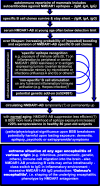Autoantibodies against the N-Methyl-d-Aspartate Receptor Subunit NR1: Untangling Apparent Inconsistencies for Clinical Practice
- PMID: 28298911
- PMCID: PMC5331041
- DOI: 10.3389/fimmu.2017.00181
Autoantibodies against the N-Methyl-d-Aspartate Receptor Subunit NR1: Untangling Apparent Inconsistencies for Clinical Practice
Abstract
This viewpoint review provides an integrative picture of seemingly contradictory work published on N-methyl-d-aspartate receptor 1 (NMDAR1) autoantibodies (AB). Based on the present state of knowledge, it gives recommendations for the clinical decision process regarding immunosuppressive treatment. Brain antigen-directed AB in general and NMDAR1-AB in particular belong to a preexisting autoimmune repertoire of mammals including humans. Specific autoimmune reactive B cells may get repeatedly (perhaps transiently) boosted by various potential stimulants (e.g., microbiome, infections, or neoplasms) plus less efficiently suppressed over lifespan (gradual loss of tolerance), likely explaining the increasing seroprevalence upon aging (>20% NMDAR1-AB in 80-year-old humans). Pathophysiological significance emerges (I) when AB-specific plasma cells settle in the brain and produce large amounts of brain antigen-directed AB intrathecally and/or (II) in conditions of compromised blood-brain barrier (BBB), for instance, upon injury, infection, inflammation, or genetic predisposition (APOE4 haplotype), which then allows substantial access of circulating AB to the brain. Regarding NMDAR1-AB, functional effects on neurons in vitro and elicitation of brain symptoms in vivo have been demonstrated for immunoglobulin (Ig) classes, IgM, IgA, and IgG. Under conditions of brain inflammation, intrathecal production and class switch to IgG may provoke high NMDAR1-AB (and other brain antigen-directed AB) levels in cerebrospinal fluid (CSF) and serum, causing the severe syndrome named "anti-NMDAR encephalitis," which then requires immunosuppressive therapy on top of the causal encephalitis treatment (if available). However, negative CSF NMDAR1-AB results cannot exclude chronic effects of serum NMDAR1-AB on the central nervous system, since the brain acts as "immunoprecipitator," particularly in situations of compromised BBB. In any case of suspected symptomatic consequences of circulating AB directed against brain antigens, leakiness of the BBB should be evaluated by CSF analysis (albumin quotient as proxy) and magnetic resonance imaging before considering immunosuppression.
Keywords: blood–brain barrier dysfunction; cerebrospinal fluid; functionality assays; healthy subjects; immunoglobulin class; inflammation; neuropsychiatric diseases; serum.
Figures
Similar articles
-
Autoantibodies against N-methyl-d-aspartate receptor 1 in health and disease.Curr Opin Neurol. 2018 Jun;31(3):306-312. doi: 10.1097/WCO.0000000000000546. Curr Opin Neurol. 2018. PMID: 29474316 Free PMC article. Review.
-
Multiple inducers and novel roles of autoantibodies against the obligatory NMDAR subunit NR1: a translational study from chronic life stress to brain injury.Mol Psychiatry. 2021 Jun;26(6):2471-2482. doi: 10.1038/s41380-020-0672-1. Epub 2020 Feb 24. Mol Psychiatry. 2021. PMID: 32089545 Free PMC article.
-
The brain as immunoprecipitator of serum autoantibodies against N-Methyl-D-aspartate receptor subunit NR1.Ann Neurol. 2016 Jan;79(1):144-51. doi: 10.1002/ana.24545. Epub 2015 Dec 2. Ann Neurol. 2016. PMID: 26505629
-
Uncoupling the widespread occurrence of anti-NMDAR1 autoantibodies from neuropsychiatric disease in a novel autoimmune model.Mol Psychiatry. 2019 Oct;24(10):1489-1501. doi: 10.1038/s41380-017-0011-3. Epub 2018 Feb 9. Mol Psychiatry. 2019. PMID: 29426955 Free PMC article.
-
Diagnostic value of CSF findings in antibody-associated limbic and anti-NMDAR-encephalitis.Seizure. 2013 Mar;22(2):136-40. doi: 10.1016/j.seizure.2012.12.013. Epub 2013 Jan 11. Seizure. 2013. PMID: 23318046 Review.
Cited by
-
Neural Autoantibodies in Cerebrospinal Fluid and Serum in Clinical High Risk for Psychosis, First-Episode Psychosis, and Healthy Volunteers.Front Psychiatry. 2021 Mar 26;12:654602. doi: 10.3389/fpsyt.2021.654602. eCollection 2021. Front Psychiatry. 2021. PMID: 33841216 Free PMC article.
-
Anti-N-methyl-D-aspartate receptor encephalitis after coronavirus disease 2019: A case report and literature review.Medicine (Baltimore). 2022 Sep 2;101(35):e30464. doi: 10.1097/MD.0000000000030464. Medicine (Baltimore). 2022. PMID: 36107550 Free PMC article. Review.
-
Limited preventive effect of prednisone on neuropsychiatric symptoms in murine systemic lupus erythematosus.Inflammopharmacology. 2019 Jun;27(3):511-520. doi: 10.1007/s10787-019-00587-4. Epub 2019 Mar 25. Inflammopharmacology. 2019. PMID: 30911862
-
Autoimmune encephalitis during pregnancy: A diagnostic and therapeutic challenge-A systematic review with individual patients' analysis and clinical recommendations.Epilepsia Open. 2023 Dec;8(4):1221-1240. doi: 10.1002/epi4.12806. Epub 2023 Sep 15. Epilepsia Open. 2023. PMID: 37562964 Free PMC article.
-
Autoantibodies against N-methyl-d-aspartate receptor 1 in health and disease.Curr Opin Neurol. 2018 Jun;31(3):306-312. doi: 10.1097/WCO.0000000000000546. Curr Opin Neurol. 2018. PMID: 29474316 Free PMC article. Review.
References
Publication types
LinkOut - more resources
Full Text Sources
Other Literature Sources
Miscellaneous



